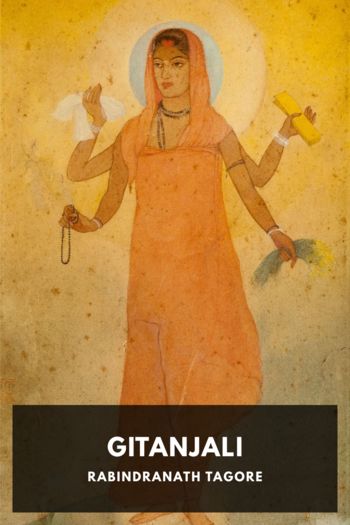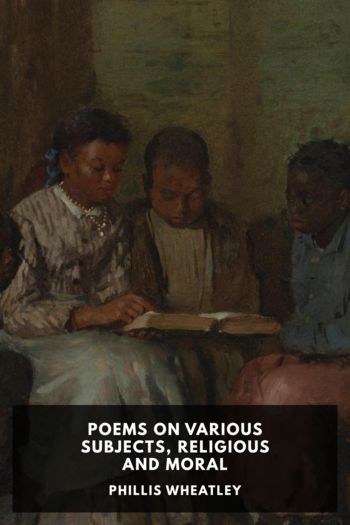My Reminiscences Rabindranath Tagore (book series for 12 year olds TXT) 📖

- Author: Rabindranath Tagore
Book online «My Reminiscences Rabindranath Tagore (book series for 12 year olds TXT) 📖». Author Rabindranath Tagore
My initiation into literature had its origin, at the same time, in the books which were in vogue in the servants’ quarters. Chief among these were a Bengali translation of Chanakya’s aphorisms, and the Ramayana of Krittivasa.
A picture of one day’s reading of the Ramayana comes clearly back to me.
The day was a cloudy one. I was playing about in the long verandah3 overlooking the road. All of a sudden Satya, for some reason I do not remember, wanted to frighten me by shouting, “Policeman! Policeman!” My ideas of the duties of policemen were of an extremely vague description. One thing I was certain about, that a person charged with crime once placed in a policeman’s hands would, as sure as the wretch caught in a crocodile’s serrated grip, go under and be seen no more. Not knowing how an innocent boy could escape this relentless penal code, I bolted towards the inner apartments, with shudders running down my back for blind fear of pursuing policemen. I broke to my mother the news of my impending doom, but it did not seem to disturb her much. However, not deeming it safe to venture out again, I sat down on the sill of my mother’s door to read the dog-eared Ramayana, with a marbled paper cover, which belonged to her old aunt. Alongside stretched the verandah running round the four sides of the open inner quadrangle, on which had fallen the faint afternoon glow of the clouded sky, and finding me weeping over one of its sorrowful situations my great-aunt came and took away the book from me.
III Within and WithoutLuxury was a thing almost unknown in the days of my infancy. The standard of living was then, as a whole, much more simple than it is now. Apart from that, the children of our household were entirely free from the fuss of being too much looked after. The fact is that, while the process of looking after may be an occasional treat for the guardians, to the children it is always an unmitigated nuisance.
We used to be under the rule of the servants. To save themselves trouble they had almost suppressed our right of free movement. But the freedom of not being petted made up even for the harshness of this bondage, for our minds were left clear of the toils of constant coddling, pampering and dressing-up.
Our food had nothing to do with delicacies. A list of our articles of clothing would only invite the modern boy’s scorn. On no pretext did we wear socks or shoes till we had passed our tenth year. In the cold weather a second cotton tunic over the first one sufficed. It never entered our heads to consider ourselves ill-off for that reason. It was only when old Niyamat, the tailor, would forget to put a pocket into one of our tunics that we complained, for no boy has yet been born so poor as not to have the wherewithal to stuff his pockets; nor, by a merciful dispensation of providence, is there much difference between the wealth of boys of rich and of poor parentage. We used to have a pair of slippers each, but not always where we had our feet. Our habit of kicking the slippers on ahead, and catching them up again, made them work none the less hard, through effectually defeating at every step the reason of their being.
Our elders were in every way at a great distance from us, in their dress and food, living and doing, conversation and amusement. We caught glimpses of these, but they were beyond our reach. Elders have become cheap to modern children; they are too readily accessible, and so are all objects of desire. Nothing ever came so easily to us. Many a trivial thing was for us a rarity, and we lived mostly in the hope of attaining, when we were old enough, the things which the distant future held in trust for us. The result was that what little we did get we enjoyed to the utmost; from skin to core nothing was thrown away. The modern child of a well-to-do family nibbles at only half the things he gets; the greater part of his world is wasted on him.
Our days were spent in the servants’ quarters in the southeast corner of the outer apartments. One of our servants was Shyam, a dark chubby boy with curly locks, hailing from the District of Khulna. He would put me into a selected spot and, tracing a chalk line all round, warn me with solemn face and uplifted finger of the perils of transgressing this ring. Whether the threatened danger was material or spiritual I never fully understood, but a great fear used to possess me. I had read in the Ramayana of the tribulations of Sita for having left the ring drawn by Lakshman, so it was not possible for me to be sceptical of its potency.
Just below the window of this room was a tank with a flight of masonry steps leading down into the water; on its west bank, along the garden wall, an immense banyan tree; to the south a fringe of coconut palms. Ringed round as I was near this window I would spend the whole day peering through the drawn Venetian shutters, gazing and gazing on this scene as on a picture book. From early morning our neighbours would drop in one by one to have their bath. I knew the time for each one to arrive. I was familiar with the peculiarities of each one’s toilet. One would stop up his ears with his fingers as he took his regulation number of dips, after which he would depart. Another would not venture on a complete immersion but be content with only squeezing his wet towel repeatedly over his head. A third would carefully drive the surface impurities away from him





Comments (0)